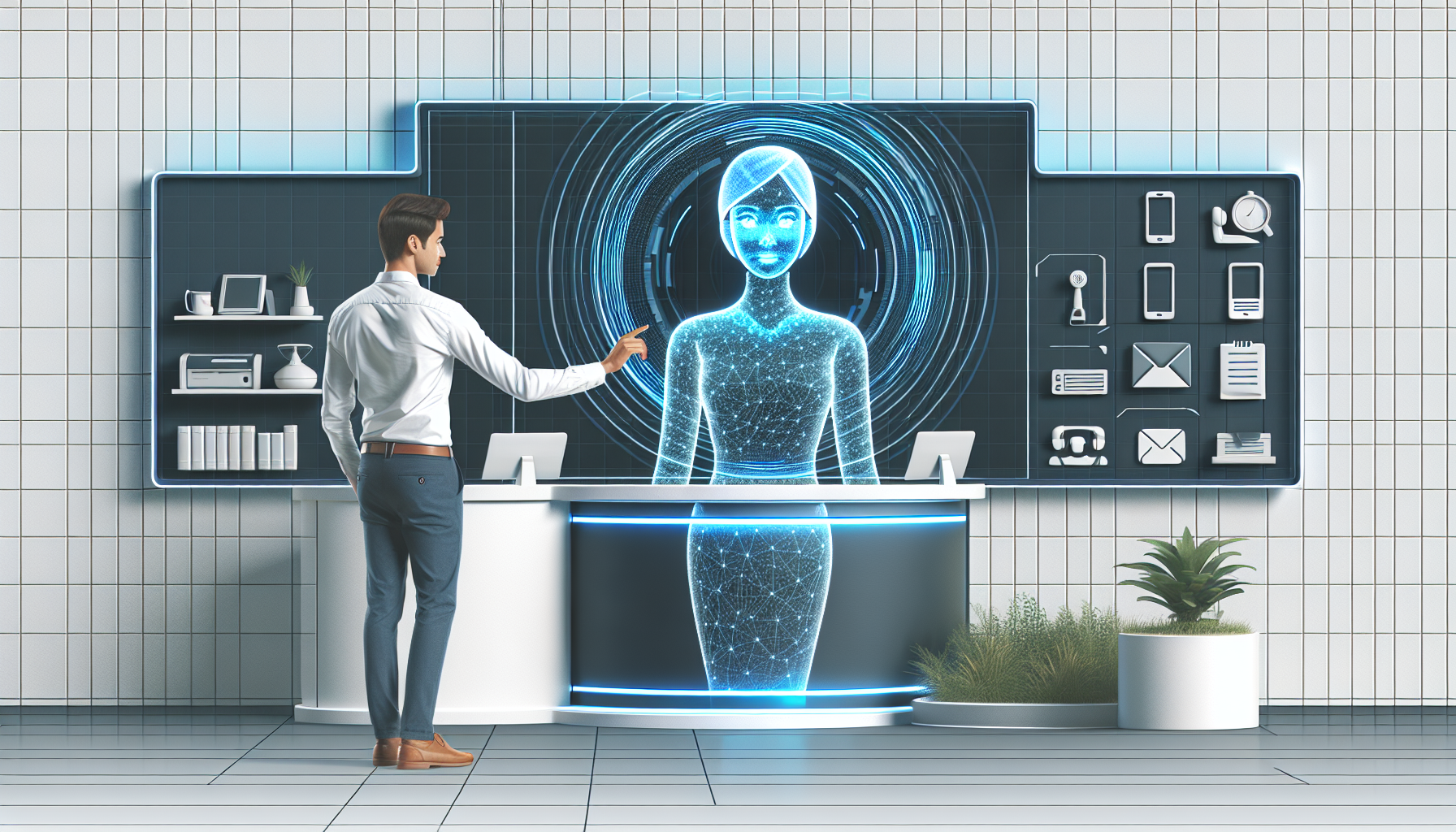
Customer service operations have experienced profound transformations over the past few years, largely driven by advancements in artificial intelligence (AI). Front and center of this transformation are AI Receptionists, increasingly becoming integral for businesses striving for efficiency and improved customer service.

AI receptionists, also known as virtual receptionists or AI assistants, function as automated personnel that bring a data-driven approach into handling tasks traditionally performed by human receptionists. These tasks include answering phone calls, transferring calls to the appropriate department, scheduling appointments, and general customer service. In implementing AI receptionists, businesses are able to streamline their front desk operations, thereby saving time and costs without compromising service quality.
By leveraging AI and machine learning algorithms, these virtual assistants are capable of natural-language processing, which allows them to interact with customers as smoothly and efficiently as possible. They can understand complex instructions, deliver accurate responses, and learn from every interaction, enhancing their performance over time.
Moreover, AI receptionists contribute significantly to Customer Journey Mapping, a strategic process of capturing and communicating complex interactions to create an intuitive customer experience. From the first point of contact to after-sale services, AI receptionists collect valuable customer data, enabling businesses to better understand their customers' needs, behaviors, and pain points. This improved insight facilitates personalized and impactful customer engagement, ultimately driving customer satisfaction and loyalty.
Ultimately, the integration of AI receptionists signifies a significant leap in transforming customer service operations. By offering a seamless, efficient, and data-driven approach, they enhance business performance and foster a culture of superior customer service.
The rise of AI Receptionists has unfolded a revolutionary movement in the customer service sector, pivoting interactions from people-centric to tech-centric. More companies are embracing the concept of Customer Journey Mapping, employing data-driven approaches to deliver personalized customer experiences.
Customer Journey Mapping is a strategic process of capturing the full customer experience across all touchpoints within an organization. It helps businesses to understand their customer's path to purchase, their pain points, preferences and identifying opportunities for improving their overall experience. This strategy is significant in enhancing not just customer satisfaction, but also establishing a loyal customer base, leading to increased sales and ROI.
Complimenting customer journey maps, is the power of the Data-driven Approach. This approach allows businesses to assimilate, interpret, and act upon data collected during customer interactions. Applying data analytics to customer journey mapping provides insights about customer activities, their preferences and their behavioural patterns. These learnings facilitate businesses to craft personalized customer communications, proactive promotions and contextual offerings, thereby enhancing the customer experience.
That's where AI Receptionists play an indispensable role. Aided by artificial intelligence, these digital front-desk representatives can collect and process a plethora of data points exponentially quicker than their human counterparts. This drastically reduces response time, ensuring customers get timely and accurate assistance, improvising customer journey at each step.
In conclusion, by judiciously combining the practices of customer journey mapping with a data-driven approach and implementing AI receptionists, an enterprise can attain the highest levels of customer satisfaction and loyalty - the ultimate goals of every successful business. Therefore, it's no surprise that more and more companies are turning towards AI and Machine learning for improving customer experience.
The integration of Artificial Intelligence (AI) in business processes has significantly transformed the dynamics of customer engagement. One of the precise areas where AI has proved to be a game changer is customer journey mapping. With the advent of AI receptionists, businesses are now capable of leveraging data-driven approaches to improve customer interactions, streamline communications and enhance service delivery.

AI receptionists are programmed to collect and analyze vast amounts of customer data in real-time. They utilize natural language processing (NLP) and machine learning algorithms to comprehend customer needs and personalize their journey. A significant aspect of this involves understanding communication patterns and using this information to automate responses. This helps organizations craft more precise and personalized solutions, thus improving the customer experience.
The utilization of AI to manage customer interactions reshapes the traditional journey map, providing a more efficient and cost-effective way of managing customer relations. Business processes are optimized, and customers’ needs are anticipated and attended to with precision and speed.
Moreover, AI receptionists also provide valuable metrics necessary for enhancing business strategy. By tracking customer behaviour and interactions, they provide insights into customer needs, preferences, and satisfaction levels. With this data, businesses can formulate better strategies to engage and retain customers, further enhancing their journey and improving customer relationships.
In conclusion, integrating AI receptionists with customer journey mapping provides a data-driven approach that significantly enhances customer interaction, improves service delivery and helps businesses thrive in an increasingly competitive landscape.
As businesses grapple with the rise in consumer expectations, several companies are turning to AI Receptionists to refine their Customer Journey Mapping. Integrating artificial intelligence into customer management practices can help companies interpret and present user data more effectively. Two such companies that have integrated AI receptionists into their customer journey with impressive results are Amelia by IPsoft and Zo by Microsoft.
The first case study involves IPsoft's Amelia, a leading AI in the technology sector. Amelia is not restricted to the roles of a conventional receptionist but understands, interacts, and improvises to resolve customer issues, much like a human would. After her implementation, companies reported a 60% increase in customer self-service, along with an impressive 85% success rate in customer interactions. These statistics underscore Amelia's role in improving the user experience by reducing consumer frustration and enhancing the customer journey.
Our second example is the conversational AI, Zo by Microsoft. Zo was designed to engage users on several social platforms, making user interactions more personal, engaging, and streamlined. Leveraging natural language processing, Zo greatly enhanced customer experience by rapidly understanding and responding to user needs with 90% accuracy. This seamless communication facilitated an uninterrupted and enriched customer journey.
These cases illustrate how AI Receptionists can reshape the customer journey mapping process, incorporating data-driven insights to enhance customer experience. By correctly leveraging their capabilities, businesses can streamline customer interactions, boost satisfaction rates, and ultimately, drive growth. The success stories of Amelia by IPsoft and Zo by Microsoft hint at a future where human-AI collaborations define the standard of effective customer management strategies.
As we stand at the crossroads of technological innovation, one concept that continues to draw focus is that of the “smart office” spearheaded by the role of AI Receptionists. Looking ahead, experts speculate several key advancements in AI technology that have the potential to redefine customer service and customer journey mapping.

AI receptionists, with their ability to manage multiple complex tasks simultaneously, are predicted to play a central role in customer journey mapping. Technological improvements now allow AI receptionists not only to respond to queries but also anticipate needs by analyzing customer data. They can map out varying customer journeys, providing personalized and efficient experiences.
Machine Learning (ML), a subset of AI, is another focal point. ML algorithms can learn from and make decisions based on data, enabling AI receptionists to improve over time. This ongoing development aids in better understanding individual customer profiles, predicting future behaviors, and providing optimal solutions. Researchers and industry professionals are continually working on expanding this frontier, resulting in tangible benefits to customer journey mapping.
However, data privacy is a significant consideration. As AI receptionists need substantial amounts of data to operate effectively, regulations like the General Data Protection Regulation (GDPR) influence their design and development. It’s crucial to navigate these regulations effectively, securing personal data while offering outstanding and personalized customer service.
Additionally, there's potential for emotional AI to become more prevalent. Emotional AI interprets human emotions, allowing AI receptionists to respond with appropriate empathy. An investigation into and development of these technologies can entirely transform the emotional aspect of customer interaction, enabling a more human-like customer journey.
There's not a fragment of doubt that the landscape of customer service and journey mapping will evolve hand in hand with AI technology. The potential shifts suggested here hint at a future where the lines between human and machine-led customer service become increasingly blurred, leading to a more efficient, personalized, and engaging customer journey.
```Start your free trial for My AI Front Desk today, it takes minutes to setup!








